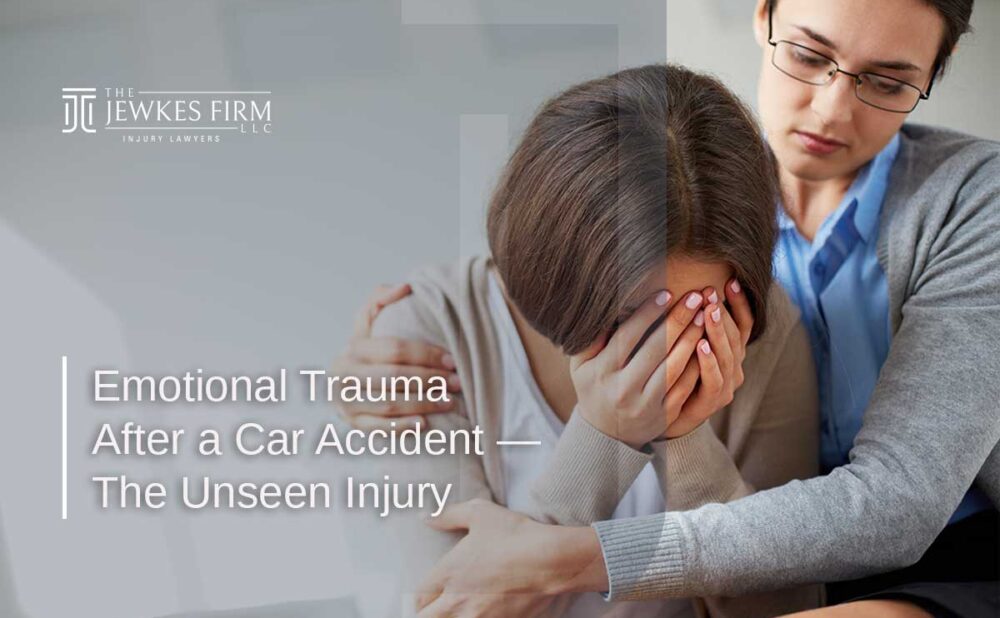Emotional Trauma After a Car Accident — The Unseen Injury
Car accidents can be life-altering events, often leaving victims with more than just physical injuries. When most people think of injuries from car accidents, they imagine broken bones, bruises, or whiplash. However, one of the most overlooked consequences of a serious collision is emotional trauma—the kind that lingers long after the physical wounds have healed.
At The Jewkes Firm, we understand that the psychological toll of a crash can be just as debilitating as any physical injury. Whether the accident was a minor fender-bender or a devastating multi-car pileup, emotional trauma deserves legal and medical attention—especially here in Georgia, where motor vehicle crashes are alarmingly common. In this article, we will explore the unseen effects of emotional trauma following a car accident, its implications, and the importance of addressing these issues in personal injury claims.
What is Emotional Trauma?
Emotional trauma refers to the psychological impact of a distressing event, such as a car accident. It can manifest in various ways, affecting an individual’s mental health, relationships, and overall quality of life. Unlike physical injuries, emotional trauma often remains invisible, making it challenging for victims to articulate their experiences and for others to understand their struggles.
When a car accident occurs, the body goes into a state of shock. This survival mechanism can make it difficult for accident victims to process what has happened, leading to delayed emotional reactions. For some individuals, the trauma of the event becomes so intense that it disrupts their day-to-day life, making it harder to function normally.
Injured In A Car Wreck? Contact Us For A Free Consultation
Injured In A Car Wreck?

Common Symptoms of Emotional Trauma After a Car Accident
Emotional trauma can manifest in different ways for different people, but there are some common signs to watch out for. Victims of car accidents may experience a range of emotional symptoms, including:
Post-Traumatic Stress Disorder (PTSD)
One of the most serious emotional reactions to a traumatic event like a car accident is PTSD. Victims of PTSD often relive the event through flashbacks, nightmares, or intrusive thoughts. Symptoms of PTSD can interfere with daily life and lead to intense feelings of fear, anxiety, and detachment. Even after the physical injuries from the crash have healed, the emotional scars can linger, affecting personal relationships, work, and overall quality of life.
Anxiety and Panic Attacks
Many car accident victims experience heightened anxiety following a crash. They may develop a fear of driving, avoid certain roads, or even become anxious while riding as a passenger. In some cases, this anxiety can escalate into panic attacks—sudden and overwhelming periods of intense fear. Symptoms of panic attacks include a racing heart, shortness of breath, dizziness, and feelings of impending doom.
Depression
The emotional aftermath of a car accident can lead to depression, particularly if the victim suffers from long-term physical injuries, has difficulty returning to their routine, or feels isolated. Symptoms of depression include sadness, hopelessness, irritability, changes in sleep or appetite, and a loss of interest in activities that once brought joy. Car accident victims dealing with depression may find it difficult to move forward, making their recovery process even more challenging.
Survivor’s Guilt
If you were in a car accident and suffered only minor injuries while others were seriously hurt or killed, you might experience survivor’s guilt. This feeling of guilt or shame is common among individuals who survive traumatic events, even if they are not responsible for the accident. Victims may feel like they should have done something to prevent the crash. Often, victims feel guilty for being safe while others got hurt.
Fear of Driving or Carphobia
After a car accident, many people develop a fear of getting behind the wheel, also known as carphobia. This fear can be debilitating and may cause individuals to avoid driving altogether. For some, the specific circumstances of the accident, such as driving in rain or on highways, may confine the fear. For others, the fear may extend to any time they are in a car, regardless of the situation.
Difficulty in Relationships
The emotional trauma of a car accident can also strain personal relationships. The victim may withdraw emotionally, become irritable, or have difficulty communicating with loved ones. Additionally, feelings of anger, frustration, or helplessness may lead to conflict with family members, friends, or coworkers. For many accident victims, the emotional healing process requires the support of those around them.
Difficulty Concentrating
Many individuals report trouble focusing or making decisions after a traumatic event, which can hinder their professional and personal lives.
Seek professional help if you or someone you know is exhibiting these symptoms. Emotional trauma is a serious condition that can worsen over time if left untreated.

The Impact of Emotional Trauma on Daily Life
The effects of emotional trauma can permeate every aspect of a victim’s life. Relationships with family and friends may suffer as the individual withdraws or struggles to communicate their feelings. Work performance can decline due to difficulties concentrating or increased absenteeism. Additionally, the emotional toll can lead to physical health issues, such as chronic pain or fatigue, further complicating recovery.
How to Manage Emotional Trauma After a Car Accident
Healing from emotional trauma is an important part of recovering from a car accident. While the process can be slow, there are several strategies that can help you manage and eventually overcome the emotional effects:
The Importance of Seeking Help
One of the most important steps in managing emotional trauma is to speak with a mental health professional. Therapists, counselors, and psychologists help individuals process traumatic events and develop coping strategies. Cognitive behavioral therapy (CBT), for example, is a highly effective treatment for PTSD, anxiety, and depression.
Take Care of Your Physical Health
Your physical and emotional health are closely connected. Engaging in regular physical activity, eating a balanced diet, getting enough sleep, and practicing relaxation techniques (such as deep breathing or meditation) can help reduce the symptoms of emotional trauma. Prioritize self-care during your recovery process.
Build a Support Network
It is important to surround yourself with understanding and compassionate people during your recovery. Talk to family members, friends, or support groups who can provide emotional support and help you work through the trauma. Sharing your feelings with others can help reduce the isolation often felt by car accident victims.
Be Patient with Yourself
Emotional healing takes time, and it’s essential to give yourself the grace to heal at your own pace. It is normal to have setbacks along the way, but it’s important to keep moving forward, even if it’s just one step at a time.
How Emotional Trauma Impacts Your Injury Claim
Many insurance companies try to minimize psychological injuries by focusing only on physical harm. At The Jewkes Firm, we fight to ensure that your feelings and pain are taken seriously.
Emotional trauma may entitle you to compensation for:
- Mental health treatment (therapy, counseling, medication)
- Pain and suffering
- Lost wages due to anxiety or PTSD-related work disruptions
- Reduced quality of life
- Future mental health care costs
Documenting Emotional Trauma for Personal Injury Claims
At The Jewkes Firm, we emphasize the importance of documenting emotional trauma in personal injury claims. Emotional distress can significantly impact a victim’s life, and it is essential to include these effects in any legal proceedings. Here are some steps to effectively document emotional trauma:
- Keep a Journal. Maintaining a journal of thoughts, feelings, and experiences can help illustrate the emotional impact of the accident.
- Seek Professional Evaluation. A mental health professional can provide a formal assessment of emotional trauma, which can be crucial in supporting a personal injury claim.
- Gather Testimonies. Statements from family, friends, or coworkers who have witnessed changes in behavior or emotional state can strengthen a case.
- Document Treatment. Keep records of therapy sessions, medications, and any other treatments related to emotional trauma.

GEORGIA PERSONAL INJURY LAWYER NEAR ME
You Don’t Have to Suffer in Silence
Emotional trauma is a significant yet often overlooked consequence of car accidents. At The Jewkes Firm, we believe that understanding and addressing these unseen effects is vital for the recovery of our clients. If you or a loved one has experienced emotional trauma following a car accident, it is essential to seek help and consider the implications for your personal injury claim. Our team is here to support you through the legal process and ensure that your emotional suffering is recognized and compensated. Remember, you are not alone in this journey, and healing is possible.
If you or a loved one is struggling emotionally after a car crash in Georgia, don’t wait. Contact The Jewkes Firm today. Your mental health matters just as much as your physical recovery—and we’re here to stand with you every step of the way. Call us at (770) 771-5130 to schedule your free case evaluation.
We are here to help you rebuild your life after an accident – emotionally, mentally, and physically.
Frequently Asked Questions
What is emotional trauma after a car accident?
Emotional trauma refers to the psychological impact of a car accident, which can manifest as anxiety, depression, PTSD, and other emotional symptoms that affect daily life.
How do I know if I’m experiencing emotional trauma from a car accident?
Symptoms of emotional trauma can include nightmares, flashbacks, anxiety, depression, irritability, and avoiding situations that remind you of the accident. If these symptoms persist, it's important to seek professional help.
Why is it important to document emotional trauma for a personal injury claim?
Documenting emotional trauma is crucial as it can significantly impact your quality of life and support your personal injury claim. Proper documentation can help ensure you receive fair compensation for your suffering.
How can I manage emotional trauma after a car accident?
Seeking professional counseling, building a support network, practicing self-care, and being patient with your recovery are all important steps. Consulting with a lawyer experienced in personal injury cases can also help guide you through both the legal and emotional recovery process.
Can emotional trauma affect my personal injury claim?
Yes, emotional trauma can be a part of your injury claim. At The Jewkes Firm, we help clients seek compensation for both physical and emotional injuries sustained in a car accident, ensuring a comprehensive approach to your recovery.
Can The Jewkes Law Firm help with emotional trauma from a car accident?
Absolutely. At The Jewkes Firm, we understand the emotional toll a car accident can take. Our legal team helps victims recover compensation for emotional and physical trauma. Contact us today for a consultation.





